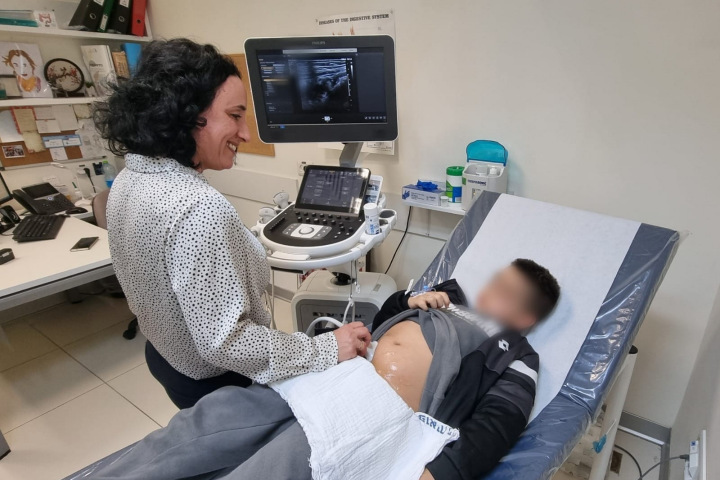Physicians are finding that ultrasound is an effective diagnostic tool for children with inflammatory bowel syndrome (IBS). Its implementation at Rambam Health Care Campus in Haifa, Israel, is not only reducing children’s exposure to radiation – it has made one of the hospital’s clinics a world-class training center in the innovative use of ultrasound technology.
 Dr. Ramit Magen Rimon, during an ultrasound examination of a young patient. Photography: Rambam HCC.
Dr. Ramit Magen Rimon, during an ultrasound examination of a young patient. Photography: Rambam HCC.
The Ruth Rappaport Children’s Hospital at Rambam is the only dedicated referral pediatric hospital in the north of Israel. Every effort is made to ensure the highest levels of training for all its healthcare personnel and the fruit of the hospital’s labor is having a worldwide impact. The International Bowel Ultrasound Group (IBUS) has recognized Rambam’s Pediatric Inflammatory Bowel Diseases (IBD) clinic, under the management of Dr. Ramit Magen Rimon, a specialist in pediatric gastroenterology, as an official international IBUS training center.
Certification of the clinic is the result of several years of work by Dr. Magen Rimon and her team: they routinely use ultrasound for testing in children suffering from IBD, and chronic intestinal inflammation (Crohn's and ulcerative colitis), rather than other devices. They have found that the results obtained from ultrasound scans are similar to those of CT or MRI scans, with several distinct benefits.
“There are profound advantages of an examination using ultrasound equipment compared with examinations using ‘heavier’ equipment,” explains Dr. Magen Rimon. “In addition to receiving an accurate diagnosis, the children are saved from exposure to CT radiation or the need for sedation, which is needed when performing MRI testing on small children. For the parent, this prevents lost work hours and for the child, absence from school.
Furthermore, costly health maintenance organization referrals for expensive tests and the need for follow-up appointments are reduced.” Additionally, Dr. Magen Rimon points out that the use of ultrasound is a more inclusive process, allowing the child to participate in the procedure. Physicians find that this leads to increased cooperation from the patient, as they are able to see the images of their internal organs in real time on the screen. This interactivity distracts them, reducing their potential feelings of fear of pain.
Dr. Magen Rimon summarizes, “Intestinal diseases in children, such as Crohn's and colitis, have a sort of ‘unique signature’ that we can detect using less expensive, reliable, and readily available equipment, such as ultrasound. Taking advantage of this technology, we save all parties involved resources, suffering, and time, and give children and parents the option for quick, real-time resolutions to the child's medical condition. The international recognition of these capabilities is another example of Rambam leading the way in excellence for Northern Israel’s children and their families.”

